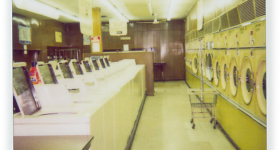In the F213 exhibition, which takes place April 13 to May 11 at the Arc Gallery in San Francisco, female artists present the imagery and female writers respond. F213 is short for Fahrenheit 213, which is one degree above the boiling point of blood. This exhibition is not about victimhood, making nice or powerlessness. It is about women united in protest.
About one-third of the artists and writers are Asian American. Each Asian American woman participating in F213 expresses her outrage about today’s misogyny, discrimination and loss of hard-won civil rights in the United States. In some cases, their work reflects their personal experience with discrimination and stereotyping due to their cultural background. In others, they protest, as citizens, the U.S. policies that lead to environmental damage, misogyny and anti-refugee sentiment. Each individual voice — artist’s and writer’s alike — amplifies and strengthens the overall message that we must speak out and protest in order to bring about change.
Janice Mirikitani
Janice Mirikitani is a Japanese American poet and activist. She is the co-founder of the Glide Memorial Foundation. She is renowned for her commitment to work that addresses the horrors of war and advocates against institutional racism and the enslavement of women and the poor. Mirikitani was San Francisco’s second Poet Laureate, appointed in 2000. She has authored five books of poetry and is the editor of nine anthologies for writers of color, women, youth and children.
As an infant, she and her family were incarcerated in a rural Arkansas concentration camp during the mass internment of Japanese Americans during World War II. Upon leaving the camp, her maternal grandparents returned to California and had to rebuild their farm. This experience was a pivotal event that contributed to Mirikitani becoming a lifelong activist.
“All Asians have faced discrimination and violence,” she says. “Racism and misogyny are built into every institution in the country. We are seeing it played out today in the increase of racist and religious hate crimes. We have been so dehumanized, it’s almost OK to kill us.”
In the F213 exhibition, she responds to Nancy Hom’s artwork No More Violence Against Asians (silkscreen and paint) with her poem, "What Form of Madness."
Excerpt found below:
“You build walls to divide us. It’s madness.
We who served your table, cooked your food, harvested your sugarcane,
We have worked your canneries, picked your crops, built your railroads,
You claim war against trade agreements, incite more race hatred.
It’s madness.
You beat us with baseball bats, jail us in concentration camps.
You kidnap our women and sell them as sex slaves,
You tell us to go back where we belong, call us enemy aliens.
You rip our children from us and cage them like animals.
You lynch us, run us out of our homes, tell us to go back to ‘shitholes’ where we came from.
You call us ‘jap, chink, slope, tonto, flip, spic, spook, raghead’ to cage our humanity.
The hate crimes rise. Killings keep mounting. Madness.”
Copyright: Janice Mirikitani, 2019 Inspired by Nancy Hom
Jennifer Kim Sohn
Jennifer Kim Sohn is a Korean American multimedia artist and environmental activist. With her background in science, she raises awareness of the hazards of industrial farming, highlighting monocropping, the agricultural practice of growing a single crop year after year on the same land, without rotation. Corn and cotton are some of the crops farmed with this method, generating large amounts of toxins from dependency upon chemical fertilizers, insecticides and pesticides. The processing of these crops also yields carcinogenic byproducts.
Her art installation, Toxic Habits, features cotton frogs deformed by toxins used in industrial farming. With each frog placed in a two-liter plastic soda bottle, Sohn makes clear the effects of our consumerism on the environment.
“Our habits as consumers drive the demand for these high-yield cash crops,” Sohn says. “A small shift in our consumer habits could bring a much needed paradigm change that favors environmental health over convenience and sustainability over disposable fast fashion choices.”
Aqsa Naveed
Aqsa Naveed, a Pakistani American Muslim artist, is an Instagram artist. With her degree in media arts and a drawing tablet, Naveed set out to create digital comics that represent her grievances and challenges of living as a Muslim woman in contemporary U.S. society. Her digital Instagram artwork, Make America Ignorant Again and Niqa Ban, slam white supremacist misogynist microaggressions and Islamophobic government policies, with witty sarcasm.
“Humor, above all, can be a healthy and relatable promoter for social change,” Naveed says. “For me, F213 isn’t just a place where I can show my artwork but be in a room filled with other people just like me. I constantly see huge gaps in our society where women don’t have the space or large audience to showcase their artwork or opinions. So, being part of a big picture like this is very important for me.”
Priscilla Otani
Priscilla Otani, a Japanese American mixed media artist, is a F213 co-curator and managing partner of Arc Gallery. She serves on the board of the Northern California Women’s Caucus for Art. Otani’s political art focuses on social issues in Japan and in the United States.
Following the Brett Kavanaugh Congressional testimony in October 2018, Otani created Liar Liar Pants on Fire, a piece to underscore the prevailing corruption of the old boys’ network that enabled and ultimately empowered Kavanaugh, despite his past behaviors. Her mixed media work consists of a pair of sewn paper men’s briefs pinned on a background of expensive Italian men’s suiting. The briefs show damages in a strategic area that could be burn marks or something more scatological. As a conceptual artist Otani is fond of literalizing metaphors and in Liar Liar Pants on Fire, her work in F213, she does so brutally.
F213 exists to pull together many individual voices of protest into one powerful, feminist exhibition. There is room for each participant to express her perspective without feeling marginalized, tokenized or censored. Asian American women, who constitute approximately 30 percent of the participants, represent a powerful force. Working together, artists and writers have the power to effect change by exposing atrocities and destructive policies.
And through this exhibition, viewers are able to experience moving installations that are representative of a population, both unique and marginalized.
F213 can be seen at the Arc Gallery in San Francisco. Admission to the gallery and to F213 events is free.
For more information about F213, visit https://www.ncwca.org or email ncwcachapter [at] gmail.com.









Comments